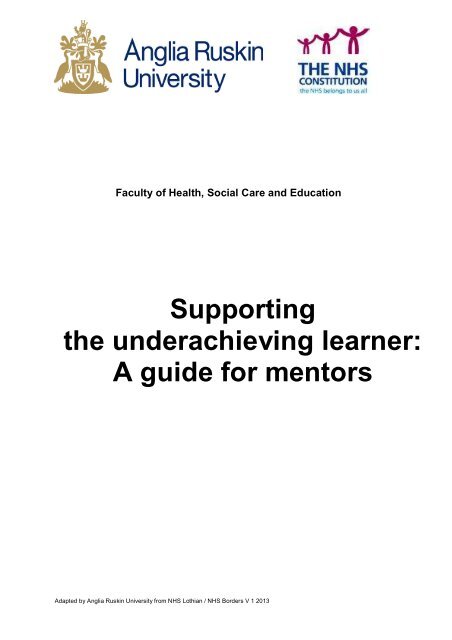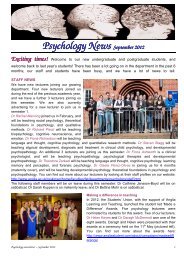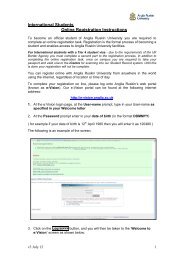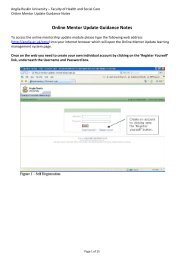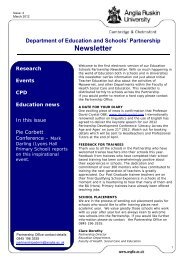Supporting the underachieving learner - Guide for mentors
Supporting the underachieving learner - Guide for mentors
Supporting the underachieving learner - Guide for mentors
You also want an ePaper? Increase the reach of your titles
YUMPU automatically turns print PDFs into web optimized ePapers that Google loves.
Faculty of Health, Social Care and Education<br />
<strong>Supporting</strong><br />
<strong>the</strong> <strong>underachieving</strong> <strong>learner</strong>:<br />
A guide <strong>for</strong> <strong>mentors</strong><br />
Adapted by Anglia Ruskin University from NHS Lothian / NHS Borders V 1 2013
Table of Contents<br />
Page<br />
1. Introduction 3<br />
1.1. How to use this guide 3<br />
1.2. Aim of workbook 3<br />
1.3. Learning outcomes 3<br />
2. Identifying <strong>the</strong> <strong>underachieving</strong> <strong>learner</strong> 3<br />
2.1. Key behaviours of <strong>the</strong> <strong>underachieving</strong> <strong>learner</strong> 4<br />
2.2. Providing feedback 6<br />
2.3. Developing an action plan to support <strong>the</strong> <strong>underachieving</strong> <strong>learner</strong> 6<br />
2.4. How to complete a <strong>for</strong>mative action plan 9<br />
3. The decision to fail <strong>the</strong> <strong>learner</strong> 10<br />
3.1. Reactions to failing a <strong>learner</strong> 12<br />
3.2. Why do <strong>mentors</strong> fail to fail? 14<br />
3.3. What happens to <strong>the</strong> <strong>learner</strong> next? 15<br />
3.4. Summary of <strong>the</strong> fail process 15<br />
3.5. Consequences of failing to fail 15<br />
4. References 20<br />
Adapted by Anglia Ruskin University from NHS Lothian / NHS Borders V 1 2013 2
1. Introduction<br />
This workbook is intended <strong>for</strong> <strong>mentors</strong> who are currently mentoring <strong>learner</strong>s and who are on <strong>the</strong> local<br />
mentor register. It specifically focuses on <strong>the</strong> <strong>underachieving</strong> <strong>learner</strong> and provides in<strong>for</strong>mation and<br />
advice on how <strong>the</strong>se <strong>learner</strong>s may best be supported.<br />
This will enable you to provide evidence of your continued <strong>mentors</strong>hip development as required <strong>for</strong><br />
your triennia/biennial review. Please access in<strong>for</strong>mation about <strong>the</strong> triennial/biennial review at<br />
www.anglia.ac.uk/<strong>mentors</strong><br />
1.1 How to use this guide<br />
There are seven activities within this workbook, which include reflection and case scenario activities.<br />
You may find that only some of <strong>the</strong>se activities meet your learning needs and <strong>the</strong>re<strong>for</strong>e may opt to do<br />
those relevant to your current clinical situation. The concluding activity will support you in<br />
consolidating your learning.<br />
1.2 Aim of <strong>the</strong> workbook<br />
The aim of <strong>the</strong> workbook is to enable you to critically reflect on <strong>the</strong> processes involved in supporting<br />
and managing a <strong>learner</strong> who is failing to meet <strong>the</strong> NMC/HCPC proficiencies <strong>for</strong> registration and /or<br />
lacks understanding of <strong>the</strong> principles and values inherent in <strong>the</strong> NHS Constitution. The development<br />
of an action plan to resolve such situations will be discussed. This workbook can be used as portfolio<br />
evidence <strong>for</strong> your personal development plan (PDP).<br />
N.B Much of <strong>the</strong> focus in this document is on <strong>the</strong> skill of action planning. The University does not<br />
expect action planning to be limited to <strong>underachieving</strong> <strong>learner</strong>s. Action planning should benefit all<br />
<strong>learner</strong>s in progressing <strong>the</strong>ir skills and knowledge.<br />
1.3 Learning Outcomes:<br />
On completion of this workbook you should be able to:<br />
Identify and critically reflect on <strong>the</strong> common behaviours of <strong>the</strong> <strong>underachieving</strong> <strong>learner</strong>.<br />
Utilise a problem solving approach to construct an action plan to support <strong>the</strong> learning needs of<br />
an <strong>underachieving</strong> <strong>learner</strong><br />
Based on <strong>the</strong> best evidence, consider <strong>the</strong> implications of failing a <strong>learner</strong><br />
Critically reflect on <strong>the</strong> consequences of ‘failing to fail’<br />
2. Identifying <strong>the</strong> Underachieving Learner<br />
Most <strong>learner</strong>s successfully achieve <strong>the</strong>ir learning outcomes on placement. However, some <strong>learner</strong>s<br />
do not per<strong>for</strong>m at <strong>the</strong> expected level and evidence suggests that <strong>mentors</strong> find this one of <strong>the</strong> most<br />
challenging aspects of <strong>the</strong> mentoring role (Duffy and Hardicre 2007a). Many contributing factors can<br />
influence how to deal effectively with this aspect of <strong>the</strong> mentor’s role such as:<br />
Uncertainty about expected levels of competence<br />
Allowing a settling in period<br />
Time constraints<br />
Conflicting shift patterns<br />
Lack of confidence in dealing with <strong>the</strong> issue<br />
Lack of support <strong>for</strong> <strong>the</strong> mentor<br />
Mentors often have an instinctive feeling at an early stage of <strong>the</strong> placement about a <strong>learner</strong>’s<br />
per<strong>for</strong>mance but may have difficulty in articulating or describing what is often a vague concern. It is<br />
important that <strong>the</strong> mentor is able to recognise <strong>the</strong> behaviours of <strong>the</strong> <strong>underachieving</strong> <strong>learner</strong>, identify<br />
Adapted by Anglia Ruskin University from NHS Lothian / NHS Borders V 1 2013 3
<strong>the</strong>m objectively, gain support from key colleagues (Higher Education Institute (HEI) , education<br />
champions, link tutors, practice education facilitators (PEFs), line manager and peers), and take steps<br />
to address concerns in an appropriate and timely manner.<br />
Following a directive from <strong>the</strong> NMC, <strong>learner</strong>s are now required to carry a progress record of <strong>the</strong>ir<br />
achievement with summaries of previous <strong>mentors</strong>’ assessments. Please ask <strong>learner</strong>s to provide you<br />
with <strong>the</strong>ir previous practice documents. It may be valuable to review this documentation with <strong>the</strong><br />
<strong>learner</strong> to gain an understanding of how <strong>the</strong> <strong>learner</strong> views <strong>the</strong>ir previous assessment and<br />
development. Any identified factors from this should not influence your assessment decisions, but<br />
may help in<strong>for</strong>m a strategy of support and guidance.<br />
Examples of this include:<br />
Ensuring particular learning experiences are made available<br />
Offering reassurance of abilities<br />
Seeking support from <strong>the</strong> HEI regarding specific learning needs (if disclosed by <strong>the</strong> <strong>learner</strong>).<br />
Providing constructive feedback<br />
Ongoing <strong>for</strong>mative assessment<br />
Development of action plans<br />
The mentor also needs to ensure <strong>the</strong>y have a realistic expectation of per<strong>for</strong>mance <strong>for</strong> <strong>the</strong> stage in <strong>the</strong><br />
<strong>learner</strong>’s programme. Discussing this with <strong>the</strong> <strong>learner</strong> and considering <strong>the</strong> appropriate practice<br />
assessment document can help clarify <strong>the</strong> knowledge and skills expected from <strong>the</strong> <strong>learner</strong>. If<br />
necessary seek additional advice from <strong>the</strong> relevant HEI education champion and link tutor.<br />
2.1 Key behaviours of <strong>the</strong> <strong>underachieving</strong> <strong>learner</strong><br />
Whilst many <strong>mentors</strong> voice concerns around <strong>the</strong> <strong>the</strong>oretical knowledge and practical skills displayed<br />
by a <strong>learner</strong>, <strong>the</strong>y often state that <strong>the</strong>y have more difficulty in objectively identifying and measuring<br />
<strong>the</strong> per<strong>for</strong>mance of those <strong>learner</strong>s who display 'problematic behaviour' or have an 'attitude' problem.<br />
The <strong>underachieving</strong> <strong>learner</strong>s often display a range of behaviours as identified by research conducted<br />
by Maloney et al. 1997; Skingley et al. 2007; Duffy 2003.<br />
Examples of behaviours of <strong>the</strong> <strong>underachieving</strong> <strong>learner</strong> include:<br />
Unenthusiastic attitude - not asking questions, lack of motivation or interest<br />
Unreliable - poor punctuality or poor attendance<br />
Displays high level of anxiety - lacks confidence or initiative<br />
Inconsistent or erratic clinical per<strong>for</strong>mance<br />
Lack of <strong>the</strong>ory, knowledge, skill and provides little evidence to support <strong>the</strong>ir learning<br />
Care incomplete - patients not left com<strong>for</strong>table, poor record of care given, not passing on<br />
relevant/important in<strong>for</strong>mation<br />
Dismissive of learning opportunities - “done that be<strong>for</strong>e, don’t want to repeat”<br />
Avoidance of working with mentor - changing shifts<br />
Poor interpersonal skills - insensitive in interaction with patient/client/family<br />
Lack of insight into <strong>the</strong>ir behaviour and lack of response to feedback<br />
Preoccupied with personal issues / continual health issues<br />
Unsafe practice or judgements<br />
Absence of professional boundaries and poor professional behaviour<br />
Failure to progress and develop skills through placement<br />
Maloney et al. 1997; Skingley et al. 2007; Duffy 2003<br />
Adapted by Anglia Ruskin University from NHS Lothian / NHS Borders V 1 2013 4
You may find <strong>the</strong> following articles useful:<br />
Duffy, K. and Hardicre, J. (2007a) '<strong>Supporting</strong> Failing Learners in Practice 1: Assessment',<br />
Nursing Times 103 (47), pp28-29<br />
Duffy, K. and Hardicre, J. (2007b) '<strong>Supporting</strong> Failing Learners in Practice 2: Management',<br />
Nursing Times 103 (47), pp28-29<br />
Sharples, K. and Kelly, D. (2007) '<strong>Supporting</strong> <strong>mentors</strong> in practice', Nursing Standard 21 (39),<br />
pp44-47<br />
Activity 1<br />
With ano<strong>the</strong>r mentor consider any experience you or <strong>the</strong>y have had of <strong>learner</strong>s who displayed<br />
some of <strong>the</strong> behaviours of underachievement.<br />
What were <strong>the</strong>se behaviours and how were <strong>the</strong>y addressed?<br />
Can you think of fur<strong>the</strong>r examples of o<strong>the</strong>r actions or behaviour that might cause you concern<br />
about a <strong>learner</strong>’s per<strong>for</strong>mance?<br />
At any stage in <strong>the</strong> mentoring process, it is essential that as soon as it is recognised that <strong>the</strong> <strong>learner</strong><br />
is not per<strong>for</strong>ming to expected standards, <strong>the</strong> mentor should take appropriate action. This should<br />
involve:<br />
Discussing concerns with colleagues to consider <strong>the</strong>ir view of <strong>the</strong> <strong>learner</strong>’s per<strong>for</strong>mance. Do<br />
o<strong>the</strong>rs recognise your concerns?<br />
Collating objective evidence to demonstrate areas or aspects of per<strong>for</strong>mance that are causing<br />
concern. This could be about specific skills, care episodes or attitudes.<br />
Discussing <strong>the</strong>se concerns with <strong>the</strong> <strong>learner</strong> to gauge <strong>the</strong>ir knowledge and self awareness.<br />
The mentor should also involve <strong>the</strong> appropriate HEI education champion, link tutor and <strong>the</strong> PEF. This<br />
will ensure that key staff are aware and appropriate support put in place to give <strong>the</strong> <strong>learner</strong> full<br />
opportunity to address <strong>the</strong>ir learning needs or behaviour, and improve <strong>the</strong>ir per<strong>for</strong>mance. Involving<br />
<strong>the</strong> education champion, link tutor and PEF will also enable <strong>the</strong> mentor to be supported in <strong>the</strong>ir role<br />
and ensure objectivity in <strong>the</strong>ir assessment decisions. Anglia Ruskin University link teams aim to<br />
provide weekly support in visiting <strong>underachieving</strong> <strong>learner</strong>s and <strong>the</strong>ir <strong>mentors</strong>.<br />
Adapted by Anglia Ruskin University from NHS Lothian / NHS Borders V 1 2013 5
2.2 Providing feedback<br />
An important part of this process involves giving constructive feedback to <strong>the</strong> <strong>learner</strong>. Providing<br />
positive feedback when a <strong>learner</strong> is per<strong>for</strong>ming to <strong>the</strong> expected standard is a relatively straight<strong>for</strong>ward<br />
activity. However, when faced with <strong>the</strong> <strong>underachieving</strong> <strong>learner</strong> and <strong>the</strong> need to improve <strong>the</strong>ir<br />
per<strong>for</strong>mance, it is much more challenging.<br />
If feedback is required consider <strong>the</strong> type of feedback that you want to give. Whe<strong>the</strong>r written or verbal,<br />
it is important <strong>the</strong> <strong>learner</strong> understands that you are per<strong>for</strong>ming <strong>the</strong> feedback as part of <strong>the</strong> overall<br />
assessment. It is important to avoid delay, to allow <strong>the</strong> <strong>learner</strong> to reflect as close to <strong>the</strong> event as<br />
possible. This will also give <strong>the</strong> <strong>learner</strong> more time within <strong>the</strong>ir placement to provide you with <strong>the</strong><br />
evidence of <strong>the</strong>ir learning and <strong>the</strong> changes <strong>the</strong>y have made. It is also necessary to explain to <strong>the</strong><br />
<strong>learner</strong> your perception of <strong>the</strong>ir progress. This allows you to supportively challenge, whilst explaining<br />
how you as a professional came to your conclusion.<br />
Relate your observations back to <strong>the</strong> <strong>learner</strong>’s learning outcomes. Be specific and use examples of<br />
practice or behaviour you wish to highlight. Using phrases such as ‘I noticed.., I feel…’ can help as<br />
this rein<strong>for</strong>ces to <strong>the</strong> <strong>learner</strong> that as <strong>the</strong> mentor you are required to make a judgement on <strong>the</strong>ir<br />
progress using <strong>the</strong> evidence at your disposal. Giving constructive feedback will provide <strong>the</strong><br />
opportunity to discover if <strong>the</strong> <strong>learner</strong> has insight into his/her development needs.<br />
To conclude, it is important to reiterate <strong>the</strong> key points that have been discussed and explore with <strong>the</strong><br />
<strong>learner</strong> how you as <strong>the</strong> mentor can help facilitate <strong>the</strong> remainder of <strong>the</strong>ir practice placement. It is<br />
important to consider <strong>the</strong> professional opinions of your colleagues if <strong>the</strong>y have been involved in<br />
supporting <strong>the</strong> <strong>learner</strong> you are assessing. This may include supportive educational staff from within<br />
<strong>the</strong> clinical area or <strong>the</strong> HEI. The <strong>for</strong>mulation of an action plan will give structure to <strong>the</strong> assessment<br />
process and help <strong>the</strong> <strong>learner</strong> achieve <strong>the</strong>ir learning outcomes.<br />
You may want to look at <strong>the</strong> following articles <strong>for</strong> more detail on providing feedback:<br />
Duffy, K. and Hardicre, J. (2007a) '<strong>Supporting</strong> Failing Students in Practice 1: Assessment',<br />
Nursing Times 103 (47), pp28-29<br />
Royal College of Nursing (2007) Guidance <strong>for</strong> <strong>mentors</strong> of students nurses and midwives: An<br />
RCN Toolkit. Royal College of Nursing: London.<br />
2.3 Developing an action plan to support <strong>the</strong> <strong>underachieving</strong> <strong>learner</strong><br />
Documenting any concerns about <strong>the</strong> <strong>learner</strong> is key to <strong>the</strong> process of supporting and mentoring an<br />
<strong>underachieving</strong> <strong>learner</strong>. This in<strong>for</strong>mation will be required when providing evidence of support if <strong>the</strong><br />
<strong>learner</strong> eventually fails. The principles <strong>for</strong> good record keeping need to be applied and <strong>the</strong><br />
documentation should be:<br />
Factual<br />
Non-judgmental<br />
Identify strengths and weaknesses and<br />
Include specific examples when appropriate<br />
It is recommended that if <strong>the</strong> mentor needs to develop an action plan <strong>the</strong>y contact <strong>the</strong> relevant HEI<br />
education champion, link tutor and <strong>the</strong> PEF to make <strong>the</strong>m aware of <strong>the</strong> situation and <strong>for</strong> support.<br />
Below are actions that could be taken to support <strong>the</strong> <strong>underachieving</strong> <strong>learner</strong> and help enable <strong>the</strong>m to<br />
achieve <strong>the</strong>ir placement learning outcomes.<br />
Adapted by Anglia Ruskin University from NHS Lothian / NHS Borders V 1 2013 6
Actions to support <strong>the</strong> <strong>underachieving</strong> <strong>learner</strong><br />
Invite <strong>the</strong> <strong>learner</strong> to conduct ei<strong>the</strong>r a written or verbal self-assessment feedback on <strong>the</strong>ir<br />
progress to date<br />
Formulate an action plan<br />
Clearly identify evidence of success<br />
Formulate learning objectives <strong>for</strong> <strong>the</strong> next meeting<br />
Identify appropriate learning opportunities to meet <strong>the</strong> objectives<br />
Identify required knowledge input and sources of <strong>the</strong>se<br />
Plan <strong>the</strong> date of <strong>the</strong> next meeting.<br />
Activity 2<br />
Duffy and Hardicre 2007a<br />
With ano<strong>the</strong>r mentor discuss <strong>the</strong> importance and significance of <strong>the</strong>se recommended actions.<br />
Can you think of any fur<strong>the</strong>r actions that may be important to do at this stage to support <strong>the</strong><br />
<strong>learner</strong>?<br />
Although <strong>the</strong> development of an action plan may be a difficult task <strong>for</strong> a mentor and <strong>learner</strong>, <strong>the</strong><br />
exercise can be confidence building and sets clear guidance on areas that <strong>the</strong> <strong>learner</strong> requires fur<strong>the</strong>r<br />
knowledge, skills and development. This is a good opportunity to utilise colleagues <strong>for</strong> advice and<br />
support.<br />
Figure 1 provides a template <strong>for</strong> an action plan and it is recommended that it should:<br />
Identify learning outcomes / areas <strong>for</strong> development<br />
Detail how learning outcomes will be achieved (<strong>the</strong> actions and resources required)<br />
List evidence of achievement.<br />
Provide a date <strong>for</strong> achievement<br />
Be agreed and signed by both <strong>the</strong> mentor and <strong>learner</strong>.<br />
Adapted by Anglia Ruskin University from NHS Lothian / NHS Borders V 1 2013 7
FIGURE 1: Formative Action Plan<br />
(To be completed by <strong>learner</strong> and mentor)<br />
STUDENT SID:<br />
Student Name: ____________________________________ Mentor Name: _______________________________________________<br />
Date Learning Outcomes/<br />
Areas <strong>for</strong> development<br />
Learning<br />
Resources/Actions<br />
Evidence of<br />
achievement<br />
Review Date<br />
Mentor<br />
signature<br />
Student<br />
signature<br />
Needs and interests,<br />
areas of Essential<br />
knowledge and skill.<br />
Methods and situations <strong>for</strong><br />
how and when learning can<br />
occur.<br />
Achieved/Not<br />
achieved<br />
Adapted by Anglia Ruskin University from NHS Lothian / NHS Borders V 1 2013 8
2.4 How to complete a Formative Action Plan<br />
Student Name: _____________________________________ Mentor Name: _______________________________________________<br />
Date Learning Outcomes/ Areas<br />
<strong>for</strong> development<br />
Learning Resources/Actions Evidence of<br />
achievement<br />
Review Date<br />
Mentor<br />
signature<br />
Student<br />
signature<br />
Needs and interests, areas of<br />
essential knowledge and skill.<br />
Methods and situations <strong>for</strong> how<br />
and when learning can occur.<br />
Achieved/Not<br />
achieved<br />
Identify <strong>the</strong> areas that <strong>the</strong> <strong>learner</strong><br />
requires to obtain fur<strong>the</strong>r knowledge,<br />
skills, competence or changes in<br />
attitude.<br />
A useful starting point when<br />
completing this is to refer to <strong>the</strong><br />
<strong>learner</strong>’s Practice Assessment<br />
Document. This will enable you to<br />
identify areas <strong>for</strong> development and<br />
determine which areas <strong>the</strong> <strong>learner</strong><br />
needs to address in order to achieve<br />
<strong>the</strong> adequate level of competence<br />
and placement learning outcomes.<br />
Examples of <strong>the</strong>se include<br />
The inability to administer medicines<br />
correctly<br />
Identify <strong>the</strong> actions required to<br />
specifically enable <strong>the</strong> <strong>learner</strong> to<br />
improve in <strong>the</strong>ir per<strong>for</strong>mance.<br />
These could include reading,<br />
observation of practice or undertaking<br />
specific tasks.<br />
An example of this in relation to<br />
inability to administer medicines<br />
correctly could be to:<br />
1. Read <strong>the</strong> NMC <strong>Guide</strong>line <strong>for</strong><br />
Administering Medicines<br />
2. Read <strong>the</strong> trust policy on Medicine<br />
Administration<br />
3. With a registered nurse/midwife<br />
participate in drug administration <strong>for</strong> 6<br />
patients at least twice weekly.<br />
This should include how<br />
<strong>the</strong> mentor and <strong>learner</strong><br />
are going to ascertain<br />
whe<strong>the</strong>r <strong>the</strong> areas <strong>for</strong><br />
development have been<br />
adequately improved.<br />
The <strong>learner</strong> must provide<br />
evidence of improvement<br />
in knowledge, skills,<br />
competence or change in<br />
attitude in relation to <strong>the</strong><br />
areas <strong>for</strong> development.<br />
A range of <strong>the</strong> following<br />
provide examples of<br />
<strong>the</strong>se:<br />
1. Observation in practice<br />
by <strong>the</strong> mentor<br />
2. Reflection<br />
A date should be<br />
set to review <strong>the</strong><br />
<strong>learner</strong>’s progress<br />
to ascertain<br />
whe<strong>the</strong>r <strong>the</strong>ir<br />
knowledge, skills,<br />
competence or<br />
change in attitude<br />
are progressing or<br />
have been<br />
achieved.<br />
Ideally this should<br />
be on a weekly<br />
basis and <strong>the</strong><br />
principles <strong>for</strong><br />
effective feedback<br />
should be followed<br />
at <strong>the</strong>se meetings.<br />
Poor attendance and/or punctuality<br />
Lack of ability to prioritise care.<br />
4. Undertake <strong>the</strong> necessary<br />
patient/client checks in accordance<br />
with <strong>the</strong> NMC and trust policy when<br />
administering medication to patients.<br />
5. Observe registered<br />
nurses/midwives administering<br />
controlled drugs and discuss <strong>the</strong><br />
procedures <strong>the</strong>y undertake and <strong>the</strong><br />
rationale <strong>for</strong> <strong>the</strong>se.<br />
3. Feedback from <strong>the</strong><br />
multi-disciplinary team<br />
4. Production of mock<br />
documents (<strong>for</strong> example<br />
admission sheets and<br />
care plans)<br />
5. Discussion with<br />
mentor.<br />
Adapted by Anglia Ruskin University from NHS Lothian / NHS Borders V 1 2013 9
3. The Decision to Fail <strong>the</strong> Learner<br />
Completing an action plan to support <strong>the</strong> <strong>learner</strong> in achieving <strong>the</strong>ir learning outcomes will enable <strong>the</strong><br />
mentor to identify <strong>the</strong> necessary areas <strong>the</strong> <strong>learner</strong> has to develop in. If <strong>the</strong> mentor has undertaken this<br />
exercise and <strong>the</strong> <strong>learner</strong> still does not meet <strong>the</strong> necessary skills, knowledge or competence <strong>the</strong>y will need<br />
to fail <strong>the</strong> <strong>learner</strong>.<br />
Duffy (2003) highlighted <strong>the</strong> challenges that <strong>mentors</strong> face in following <strong>the</strong> correct procedures <strong>for</strong><br />
supporting an <strong>underachieving</strong> / failing <strong>learner</strong>. These procedures were divided into four sub-categories:<br />
1. Identifying <strong>the</strong> <strong>underachieving</strong> <strong>learner</strong><br />
2. Developing an action plan<br />
3. The decision to fail<br />
4. “After <strong>the</strong> deed is done”<br />
Actions required to address <strong>the</strong>se challenges <strong>for</strong> <strong>the</strong> first two categories have already been covered.<br />
However, <strong>the</strong>re will be times when despite <strong>the</strong>se remedial interventions, per<strong>for</strong>mance will remain poor<br />
and <strong>the</strong>re <strong>the</strong>n needs to be clear and decisive action taken.<br />
Activity 3<br />
To fail or not to fail?<br />
Take some time to reflect on <strong>the</strong> following statements and how <strong>the</strong>y could influence<br />
your decision to fail / not fail a <strong>learner</strong>:<br />
“The assessment of students in practice, whatever <strong>the</strong> setting has long been accepted as integral to any<br />
nurse education programme leading to a recognized professional qualification. Its importance lies not<br />
only in <strong>the</strong> need to certify competent practitioners, but also as a guarantor of patient safety and public<br />
protection”<br />
(Skingley et al. 2007 p28)<br />
“It is naïve to assume that all students entering clinical placement will have <strong>the</strong> knowledge, skills and<br />
attitude to be successful. There will always be students on practice placements who struggle to achieve<br />
competence. Mentors who fail to evaluate a <strong>learner</strong>’s unsatisfactory per<strong>for</strong>mance accurately are guilty of<br />
misleading <strong>the</strong> <strong>learner</strong>, potentially jeopardising patient safety and failing in <strong>the</strong>ir accountability to <strong>the</strong><br />
NMC” (Sharples and Kelly 2007 p44)<br />
“It is inevitable that some students will not be able to meet <strong>the</strong> required level of practice and it is essential<br />
that <strong>mentors</strong> do not avoid <strong>the</strong> difficult issue of having to fail <strong>the</strong>se students” (Royal College of Nursing<br />
2007 p14)<br />
Adapted by Anglia Ruskin University from NHS Lothian / NHS Borders V 1 2013 10
The decision to fail a <strong>learner</strong> is a challenging situation and needs to be handled with sensitivity. Skill and<br />
confidence is required to manage <strong>the</strong> situation effectively. The most important aspect to note is that<br />
nothing should come as a surprise to <strong>the</strong> <strong>learner</strong>.<br />
Assuming <strong>the</strong> process of identifying and supporting <strong>the</strong> failing <strong>learner</strong> has been properly carried out <strong>the</strong>n<br />
<strong>the</strong> decision can be arrived at with added conviction and confidence. This should include:<br />
The giving of constructive feedback<br />
The development of an appropriate action plan<br />
Enhanced supervision and documentation of evidence and meetings<br />
Whose decision is it anyway?<br />
Remember if <strong>the</strong> processes <strong>for</strong> dealing with a failing <strong>learner</strong> have been followed <strong>the</strong>n you will have<br />
already contacted and received support from <strong>the</strong> HEI education champion, link lecturer, PEF, colleagues<br />
and/or managers. However it needs to be recognised that:<br />
“As <strong>the</strong> named mentor, you are responsible <strong>for</strong> making <strong>the</strong> final assessment decision and are<br />
accountable <strong>for</strong> passing or failing <strong>the</strong> student. The grade you award should reflect <strong>the</strong> student’s standard<br />
of practice in <strong>the</strong> latter part of <strong>the</strong> placement. The NMC (2008) standards state that <strong>mentors</strong> must keep<br />
sufficient records to support and justify <strong>the</strong>ir decisions on whe<strong>the</strong>r a student is or is not proficient.”<br />
Activity 4<br />
Bearing in mind your accountability as a mentor <strong>for</strong> making <strong>the</strong> final assessment decision, consider <strong>the</strong><br />
following scenario :<br />
Scenario: Barbara Smith is <strong>the</strong> named mentor to a <strong>learner</strong> called Anne who has struggled considerably<br />
to meet her learning outcomes. Barbara has been reviewing progress with her weekly. Anne is now<br />
approaching <strong>the</strong> end of her placement and has not achieved <strong>the</strong> required standards and in Barbara’s<br />
opinion should be failed. A colleague who has also worked with Anne argues strongly that Anne’s<br />
practice is reasonable and that she should be passed.<br />
What should Barbara do?<br />
Adapted by Anglia Ruskin University from NHS Lothian / NHS Borders V 1 2013 11
As already discussed, <strong>the</strong> decision to fail a <strong>learner</strong> is never an easy one to make. When ano<strong>the</strong>r<br />
assessor disagrees with your decision <strong>the</strong>n <strong>the</strong> situation becomes even more complicated.<br />
A possible starting point could be to check that both assessors are using <strong>the</strong> same criteria to assess <strong>the</strong><br />
<strong>learner</strong>, as this will establish whe<strong>the</strong>r that <strong>the</strong> evidence is reliable or not. The next step could be to<br />
consider <strong>the</strong> validity of <strong>the</strong> evidence used or to put it ano<strong>the</strong>r way, whe<strong>the</strong>r you have been assessing<br />
what should be assessed. If agreement still cannot be reached <strong>the</strong>n <strong>the</strong> following actions could be<br />
considered:<br />
1. Arrange a meeting with <strong>the</strong> senior health care professional responsible <strong>for</strong> education within <strong>the</strong><br />
ward or department to discuss <strong>the</strong> situation<br />
2. Arrange a meeting with <strong>the</strong> HEI education champion, link tutor and PEF to discuss <strong>the</strong><br />
situation.<br />
These actions may already have been taken as part of <strong>the</strong> normal process of dealing with a failing<br />
<strong>learner</strong>.<br />
In relation to <strong>the</strong> scenario, Barbara should talk to her colleague, highlighting <strong>the</strong> process and reviewing<br />
<strong>the</strong> collated evidence (including discussions with colleagues, <strong>the</strong> HEI education champion, link tutor,<br />
PEF, managers), which backs her decision to fail <strong>the</strong> <strong>learner</strong>. The mentor remains accountable <strong>for</strong> <strong>the</strong><br />
final assessment decision.<br />
3.1 Reactions to failing a <strong>learner</strong><br />
The failing of a <strong>learner</strong> can cause considerable feelings and reactions <strong>for</strong> both <strong>the</strong> mentor and <strong>the</strong><br />
<strong>learner</strong>.<br />
Activity 5<br />
Take 5 minutes to consider how you might react in a situation where you had to fail a <strong>learner</strong><br />
Adapted by Anglia Ruskin University from NHS Lothian / NHS Borders V 1 2013 12
Failing a <strong>learner</strong> can have a number of effects on <strong>mentors</strong> and sometimes <strong>the</strong> whole health care team<br />
and <strong>the</strong>y may include:<br />
Frustration with <strong>learner</strong>s’ lack of positive change and resentful and angry about <strong>the</strong> demands <strong>the</strong><br />
<strong>learner</strong> places on <strong>the</strong>m<br />
Concern that <strong>the</strong>ir own skills are inadequate <strong>for</strong> a specific <strong>learner</strong>’s needs<br />
Ambivalence about <strong>the</strong>ir commitment to <strong>the</strong> dual role of nurse/ midwife and mentor<br />
Resistance to recognising serious learning difficulties because <strong>the</strong>y want <strong>the</strong> <strong>learner</strong> to succeed<br />
Anxiety that <strong>the</strong>ir own expectations are unrealistic <strong>for</strong> <strong>the</strong> <strong>learner</strong>’s stage of learning.<br />
Fear of being overruled by <strong>the</strong> HEI<br />
Maloney et al. (1997)<br />
The mentor may feel tension at <strong>the</strong> conflict between <strong>the</strong> teaching, supportive role and <strong>the</strong> assessing<br />
component and see <strong>the</strong> failure of <strong>the</strong> <strong>learner</strong> as a personal reflection of <strong>the</strong>ir standards of supervision and<br />
teaching. These reactions and effects can interfere with <strong>the</strong> fail scenario and lead to avoidance or a<br />
'failing to fail' picture developing. This was highlighted by Duffy (2003) in a report entitled “Failing<br />
students: ‘A qualitative study of factors that influence <strong>the</strong> decisions regarding <strong>the</strong> assessment of <strong>learner</strong>s’<br />
competence to practice’.<br />
Stuart (2003) highlights <strong>the</strong> o<strong>the</strong>r end of <strong>the</strong> continuum with <strong>the</strong> rare potential of <strong>mentors</strong> abusing <strong>the</strong><br />
power to fail and using it as a tool to exert control and punish 'difficult' or 'unpopular' <strong>learner</strong>s.<br />
Failed <strong>learner</strong>s may react in a number of ways. These reactions should be seen as a response to <strong>the</strong><br />
news of failure as opposed to a personal attack or vendetta against <strong>the</strong> mentor. Learners need time to<br />
process <strong>the</strong> in<strong>for</strong>mation and 'grieve' <strong>for</strong> <strong>the</strong>ir loss as a result of failing <strong>the</strong> placement. There<strong>for</strong>e <strong>the</strong><br />
discussions should be conducted in private with adequate time given to ensure that <strong>the</strong> appropriate<br />
support is provided.<br />
Activity 6<br />
Take 5 minutes to consider <strong>the</strong> possible reaction from <strong>the</strong> <strong>learner</strong> if <strong>the</strong>y are failed and how you might<br />
manage <strong>the</strong>m.<br />
Adapted by Anglia Ruskin University from NHS Lothian / NHS Borders V 1 2013 13
The <strong>learner</strong> may also have a number of reactions when <strong>the</strong>y fail and <strong>the</strong>se may include:-<br />
Denial - <strong>the</strong> <strong>learner</strong>’s perception of <strong>the</strong>ir competence differs from that of <strong>the</strong> mentor. They may<br />
deny or make excuses <strong>for</strong> <strong>the</strong>ir behaviours. The discussion needs to be focused on <strong>the</strong> learning<br />
outcomes that were not met.<br />
Anger - <strong>the</strong> <strong>learner</strong> may become abusive and accusing. If <strong>the</strong> mentor suspects that this situation<br />
may arise <strong>the</strong>n it may be wise to have <strong>the</strong> presence of a third party such as a HEI education<br />
champion, link tutor or PEF. The anger should not be taken personally.<br />
Bargaining - <strong>the</strong> <strong>learner</strong> may attempt to bargain <strong>for</strong> a pass grade. The mentor needs to stand firm<br />
and remain focused on <strong>the</strong> learning outcomes that were not achieved.<br />
Sadness - <strong>the</strong> <strong>learner</strong> may begin to cry. Allow <strong>the</strong>m to cry be<strong>for</strong>e going onto discuss <strong>the</strong> reasons<br />
<strong>for</strong> failure.<br />
Relief - some <strong>learner</strong>s may not want to be a registered health care professional but have not had<br />
<strong>the</strong> courage to make <strong>the</strong> decision <strong>for</strong> <strong>the</strong>mselves or <strong>the</strong>y have felt insecure about <strong>the</strong>ir clinical<br />
competence and learning.<br />
Stuart (2003)<br />
Some <strong>learner</strong>s learn from <strong>the</strong> experience of failure and go on to achieve success. They are able to seek<br />
out and understand <strong>the</strong> 'how come' of <strong>the</strong> failure and use this to make positive change (Maloney et al.<br />
1997). However, it is generally <strong>the</strong> case that failure is not a positive experience <strong>for</strong> most <strong>learner</strong>s!<br />
3.2 Why do <strong>mentors</strong> fail to fail?<br />
Research over recent years has identified many of <strong>the</strong> complex reasons why <strong>mentors</strong> and assessors find<br />
it difficult to assign a fail decision (Duffy 2004, Scholes and Albarran 2005, Skingley et al. 2007).<br />
What reasons did <strong>mentors</strong> give in <strong>the</strong> above research <strong>for</strong> not failing a <strong>learner</strong>?<br />
Mentors were loath to fail a <strong>learner</strong> knowing that this meant additional, time consuming work <strong>for</strong><br />
<strong>the</strong>m, as well as having to deal with <strong>the</strong> <strong>learner</strong>’s reaction.<br />
Mentors experienced tension between <strong>the</strong>ir role of carer and nurturer, with <strong>the</strong> failing of a <strong>learner</strong><br />
being contrary to <strong>the</strong> educational goals of facilitation and development. This could also lead to a<br />
sense of personal failure.<br />
Mentors lacked confidence in assessing, felt <strong>the</strong>y had inadequate preparation <strong>for</strong> <strong>the</strong>ir role, were<br />
unsure of <strong>the</strong>ir decisions and often felt <strong>the</strong>y had to give <strong>learner</strong>s <strong>the</strong> benefit of <strong>the</strong> doubt.<br />
Mentors did not feel prepared <strong>for</strong> that level of responsibility and felt it was <strong>the</strong> university’s<br />
responsibility.<br />
Learners could manipulate <strong>the</strong> mentor or system to avoid failure.<br />
Mentors expressed a lack of support from colleagues, managers and education staff when faced<br />
with a failing <strong>learner</strong>, even experiencing pressure to pass <strong>learner</strong>s.<br />
It is difficult to fail <strong>learner</strong>s in <strong>the</strong>ir 3rd year as <strong>mentors</strong> do not want to be responsible <strong>for</strong><br />
jeopardising a <strong>learner</strong>’s career so late in <strong>the</strong> programme. (Learners also felt “devastated” at being<br />
failed at this late stage and <strong>mentors</strong> felt anger that previous <strong>mentors</strong> had “passed <strong>the</strong> buck”).<br />
Adapted by Anglia Ruskin University from NHS Lothian / NHS Borders V 1 2013 14
Equally difficult is failing 1st year <strong>learner</strong>s as <strong>the</strong>re is a notion held that problems will resolve as<br />
<strong>learner</strong>s progress through <strong>the</strong>ir programme.<br />
Learners’ personal problems can influence <strong>the</strong> mentor’s judgement.<br />
If <strong>mentors</strong> had not followed all <strong>the</strong> correct procedures or felt that <strong>the</strong>y did not know <strong>the</strong> <strong>learner</strong><br />
well enough, <strong>the</strong>y felt unable to make a fail decision and again felt that <strong>the</strong>y had to give <strong>the</strong> benefit<br />
of <strong>the</strong> doubt.<br />
Mentors had found <strong>the</strong> practice assessment documentation so full of educational jargon <strong>the</strong>y had<br />
difficulty in linking <strong>learner</strong> per<strong>for</strong>mance to learning outcomes. Consequently obscure generalized<br />
comments are written which do not specify <strong>the</strong> underlying concerns about <strong>the</strong> <strong>learner</strong>’s<br />
per<strong>for</strong>mance.<br />
3.3 What happens to <strong>the</strong> <strong>learner</strong> next?<br />
If this is <strong>the</strong> first time that a <strong>learner</strong> has failed <strong>the</strong> placement experience <strong>the</strong>n <strong>the</strong>y are given an<br />
opportunity to repeat <strong>the</strong> outcomes that <strong>the</strong>y have failed. This may take place in ano<strong>the</strong>r practice area but<br />
where appropriate <strong>the</strong> <strong>learner</strong> will be expected to repeat <strong>the</strong>se outcomes in <strong>the</strong> same practice area with<br />
<strong>the</strong> same mentor. If <strong>the</strong> <strong>learner</strong> is required to change placements to repeat <strong>the</strong>se outcomes, <strong>the</strong><br />
documentation identifying reasons <strong>for</strong> failure will be made available to <strong>the</strong> new mentor.<br />
There should be no surprises when a <strong>learner</strong> fails a placement and this includes <strong>the</strong> appropriate HEI,<br />
who should be aware from an early stage of potential / actual difficulties in achieving learning outcomes.<br />
The <strong>learner</strong> has access to a range of support services from <strong>the</strong> HEI, which includes education<br />
champions, link tutors, personal tutors, module leaders, course leaders, counselling and <strong>learner</strong> union<br />
services to help through <strong>the</strong> fail process.<br />
3.4 Summary of <strong>the</strong> fail process<br />
The following points summarise <strong>the</strong> challenges and actions required when failing a <strong>learner</strong>:<br />
Difficult task <strong>for</strong> all involved<br />
Ensure discussions are conducted in private<br />
Re-iterate <strong>the</strong> problem and provide evidence to substantiate concerns<br />
Involve <strong>the</strong> HEI in <strong>the</strong> meeting through <strong>the</strong> education champion, link tutor and PEF<br />
Keep <strong>the</strong> focus on learning<br />
Never make comparisons with o<strong>the</strong>r <strong>learner</strong>s<br />
Ensure <strong>the</strong> <strong>learner</strong> is supported throughout <strong>the</strong> discussion.<br />
3.5 The consequences of ‘failing to fail’<br />
There is no doubt that failing a <strong>learner</strong> is a difficult and stressful experience <strong>for</strong> both <strong>the</strong> <strong>learner</strong> and <strong>the</strong><br />
mentor. However knowledge of one’s accountability as a mentor and <strong>the</strong> process of managing an<br />
<strong>underachieving</strong> / failing <strong>learner</strong> mean that decisions can be made with more confidence.<br />
Mentors are regarded as ‘gatekeepers’ ensuring that those <strong>learner</strong>s, who do not achieve <strong>the</strong>ir outcomes<br />
and competencies in practice, are not entered on to <strong>the</strong> professional register. This vital stage of <strong>the</strong><br />
assessment process protects <strong>the</strong> public from unsafe, incompetent and unscrupulous practitioners. There<br />
are however some concerns about how effective this ‘gate keeping’ role is being per<strong>for</strong>med. Failure to fail<br />
can have serious consequences <strong>for</strong> <strong>the</strong> health and wellbeing of <strong>the</strong> public we serve.<br />
Adapted by Anglia Ruskin University from NHS Lothian / NHS Borders V 1 2013 15
Kath Duffy (2003) in her summary of her research says:<br />
“Failing to tell students that <strong>the</strong>y have not reached <strong>the</strong> required standards also has consequences <strong>for</strong> <strong>the</strong><br />
profession. Tutors talked about students who had qualified despite having a history of problems. Passing<br />
students who should have failed does not protect <strong>the</strong> interests of <strong>the</strong> public and puts <strong>the</strong> patients who will<br />
be under <strong>the</strong>ir care at risk. This is not a new problem but one which, as professionals, we need to<br />
acknowledge, discuss and debate”.<br />
“The reality of being a mentor is that it is a complex and demanding role. Add in <strong>the</strong> issue of a<br />
problematic student and it can be overwhelming. Mentors need effective preparation and support to deal<br />
with under-per<strong>for</strong>ming students. When faced with a problematic student, <strong>mentors</strong> need extra time and<br />
guidance to fulfil <strong>the</strong>ir professional responsibility; help from experienced <strong>mentors</strong> and tutors; and strong<br />
line management support.<br />
Most importantly <strong>the</strong>re has to be <strong>the</strong> recognition that some students need to fail. So if you are thinking of<br />
giving a student <strong>the</strong> benefit of <strong>the</strong> doubt <strong>the</strong>n you should consider whe<strong>the</strong>r it is in <strong>the</strong> best interests of <strong>the</strong><br />
patients, your clients, <strong>the</strong> student, subsequent <strong>mentors</strong> and <strong>the</strong> profession as a whole.”<br />
The consequences of failing to fail in terms of public safety, protection and professional accountability<br />
have been clearly identified and recognised by <strong>the</strong> NMC. This has been a major driver in <strong>the</strong><br />
development of <strong>mentors</strong>hip through <strong>the</strong> NMC Standards to support learning and assessment in practice<br />
(SLAiP, 2008).<br />
Please see suggested reading which will help you explore <strong>the</strong> issues around <strong>the</strong> process of failing a<br />
<strong>learner</strong> and <strong>the</strong> consequences of not failing a <strong>learner</strong>:<br />
Duffy,K. (2003) Failing Students: A Qualitative Study of Factors that influence <strong>the</strong> Decisions Regarding<br />
Assessment of Students' Competence in Practice. Glasgow: Caledonian University.<br />
Scholes, J. and Albarran, J. (2005) 'Failure to fail: facing <strong>the</strong> consequences of inaction', Nursing in Critical<br />
Care 10 (3), pp23-27<br />
Adapted by Anglia Ruskin University from NHS Lothian / NHS Borders V 1 2013 16
Activity 7<br />
Consider <strong>the</strong> following scenario, or use a real-life experience of supporting an <strong>underachieving</strong><br />
<strong>learner</strong> and undertake <strong>the</strong> focused activities:<br />
Scenario: You are a mentor <strong>for</strong> Amanda, a <strong>learner</strong> in her final year and approaching qualification. She is<br />
in Week 4 of her last placement which is 12 weeks long. She is a very kind and caring person, always<br />
willing to help. Amanda is competent in providing general care and is well liked by <strong>the</strong> team. You notice,<br />
however, that she has difficulty in being able to prioritise and co-ordinate <strong>the</strong> care needs of <strong>the</strong> patient<br />
group she has responsibility <strong>for</strong>.<br />
Focused Activities<br />
1. Consider what evidence you might use in reaching your decision that Amanda is <strong>underachieving</strong>– <strong>for</strong><br />
example what are you measuring <strong>the</strong> <strong>learner</strong>’s per<strong>for</strong>mance against?<br />
2. Describe how you would give effective feedback to <strong>the</strong> <strong>learner</strong> in respect to <strong>the</strong>ir per<strong>for</strong>mance.<br />
3. Consider how you would work in collaboration with o<strong>the</strong>rs to identify and address <strong>the</strong> developmental<br />
needs of <strong>the</strong> <strong>learner</strong>.<br />
4. Complete an action plan (next page) that supports <strong>the</strong> <strong>learner</strong> to improve <strong>the</strong>ir per<strong>for</strong>mance and<br />
increase <strong>the</strong>ir confidence.<br />
Adapted by Anglia Ruskin University from NHS Lothian / NHS Borders V 1 2013 17
Formative Action Plan<br />
(To be completed by <strong>learner</strong> and mentor)<br />
Student Name: _____________________________________ Mentor Name: _______________________________________________<br />
Date Learning Outcomes/<br />
Areas <strong>for</strong> development<br />
Learning<br />
Resources/Actions<br />
Evidence of<br />
achievement<br />
Review Date<br />
Mentor<br />
signature<br />
Student<br />
signature<br />
Needs and interests,<br />
areas of Essential<br />
knowledge and skill.<br />
Methods and situations <strong>for</strong><br />
how and when learning can<br />
occur.<br />
Achieved/Not<br />
achieved<br />
Adapted by Anglia Ruskin University from NHS Lothian / NHS Borders V 1 2013 18
Formative Action Plan<br />
(To be completed by <strong>learner</strong> and mentor)<br />
Student Name: _____________________________________ Mentor Name: _______________________________________________<br />
Date Learning Outcomes/<br />
Areas <strong>for</strong> development<br />
Learning<br />
Resources/Actions<br />
Evidence of<br />
achievement<br />
Review Date<br />
Mentor<br />
signature<br />
Student<br />
signature<br />
Needs and interests,<br />
areas of Essential<br />
knowledge and skill.<br />
Methods and situations <strong>for</strong><br />
how and when learning can<br />
occur.<br />
Achieved/Not<br />
achieved<br />
Adapted by Anglia Ruskin University from NHS Lothian / NHS Borders V 1 2013 19
4. References<br />
Duffy,K. (2003) Failing Students: A Qualitative Study of Factors that influence <strong>the</strong> Decisions<br />
Regarding Assessment of Students' Competence in Practice. Glasgow: Caledonian<br />
University.<br />
Duffy, K. (2004) Mentors need more support to fail incompetent students. British Journal of<br />
Nursing 13 (10) 583<br />
Duffy, K. and Hardicre, J. (2007a) <strong>Supporting</strong> Failing Students in Practice 1: Assessment.<br />
Nursing Times 103 (47), 20-21<br />
Duffy, K. and Hardicre, J. (2007b) <strong>Supporting</strong> Failing Students in Practice 2: Management.<br />
Nursing Times 103 (47) 20-21<br />
Maloney, D. Carmody, D. and Nemeth, E. (1997) Students Experiencing Problems Learning<br />
in <strong>the</strong> Clinical Setting. In McAllister, L. Lincoln, M. McLeod, S. and Maloney, D. (eds)<br />
Nursing and Midwifery Council (2008) Standards to Support Learning and Assessment in<br />
Practice. London: NMC<br />
Royal College of Nursing (2007) Guidance <strong>for</strong> <strong>mentors</strong> of students nurses and midwives: An<br />
RCN Toolkit. Royal College of Nursing: London.<br />
Scholes, J. and Albarran, J. (2005) Failure to fail: facing <strong>the</strong> consequences of inaction.<br />
Nursing in Critical Care 10 (3), 23-27<br />
Sharples, K. and Kelly, D. (2007) <strong>Supporting</strong> <strong>mentors</strong> in practice. Nursing Standard 21 (39),<br />
44-47<br />
Skingley, A. Arnott, J. Greaves, J. and Nabb, J. (2007) <strong>Supporting</strong> practice teachers to<br />
identify failing students. British Journal of Community Nursing 12 (1), 28-32<br />
Stuart C. (2003) Assessment, Supervision and Support in Clinical Practice: A guide <strong>for</strong><br />
nurses, midwives and o<strong>the</strong>r health professionals. (1st ed) London: Churchill Livingstone.<br />
Adapted by Anglia Ruskin University from NHS Lothian / NHS Borders V 1 2013 20


